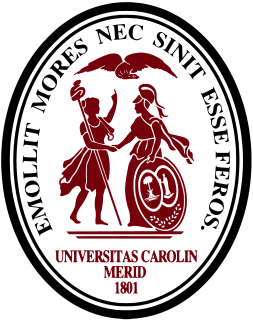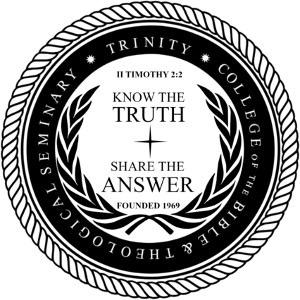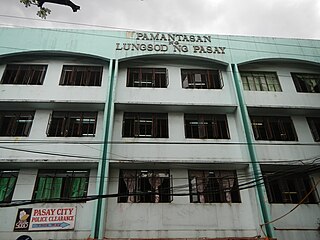A Master of Business Administration is a graduate degree focusing on business administration and investment management. The core courses in an MBA program cover various areas of business administration such as accounting, applied statistics, human resources, business communication, business ethics, business law, strategic management, business strategy, finance, managerial economics, management, entrepreneurship, marketing, supply-chain management, and operations management in a manner most relevant to management analysis and strategy. It originated in the United States in the early 20th century when the country industrialized and companies sought scientific management.

The University of South Carolina Aiken is a public university in Aiken, South Carolina. It is part of the University of South Carolina System and offers undergraduate degree programs as well as master's degrees. Additional graduate courses and degree programs are offered through the University of South Carolina Extended Graduate Campus program. The University of South Carolina Aiken awards baccalaureate degrees in more than 30 major areas of study include the bachelor of science in business administration online through Palmetto College.
Higher education in Mauritius includes colleges, universities and other technical institutions. Public university education has been free to students since 2019. The sector is managed by the Higher Education Commission (HEC) which has the responsibility for allocating public funds, and fostering, planning and coordinating the development of post-secondary education and training. Formerly the Tertiary Education Commission, in 2020 it was reformed into the HEC and a separate Quality Assurance Authority (QAA) for auditing of qualifications.

Riphah International University is a private university in Pakistan, chartered by the Federal Government of Pakistan in 2002. The university was established with the aim of producing professionals with Islamic moral and ethical values. It is sponsored by a not-for-profit trust, the Islamic International Medical College Trust (IIMCT). The first project of the IIMCT was the Islamic International Medical College in Rawalpindi, established in 1996 by its founding Managing Trustee, Zulfiqar Ali Khan. The university has fourteen constituent units and an overseas project, the RAK College of Dental Sciences, in the United Arab Emirates. The university is also working towards the establishment of a campus in Mauritius.
The Distance Education Accrediting Commission (DEAC), formerly the National Home Study Council and then as the Distance Education and Training Council, is a non-profit national educational accreditation agency in the United States specializing in the accreditation of distance education programs of study and institutions. The U.S. Department of Education identifies DEAC to be among the recognized institutional accrediting agencies in the U.S. that operate as reliable authorities concerning the quality of education offered by the institutions of higher education they accredit.
Katharine Gibbs College was a for-profit institution of higher learning based in the United States of America, founded by Katharine Gibbs.

Trinity College of the Bible and Theological Seminary, also known as Trinity College of the Bible, is a conservative evangelical Bible college and seminary located near Evansville, Indiana. Trinity offers distance education programs at undergraduate, graduate, and doctoral degree levels for self-directed adult learners. Programs include Certificate, Associate, Bachelor, Master, and Doctorate studies. In 2006, Trinity claimed more than 7,000 active students worldwide.

The University of Nicosia was established in 1980 and its main campus is located in Nicosia, the capital city of Cyprus. It also runs study centres in Athens, Bucharest and New York.

The Commission for Academic Accreditation (CAA) is the UAE Federal Government Quality Assurance Agency for Higher Education. Working collaboratively with relevant national and local authorities in the Emirates, the CAA has a key leadership role in securing and developing the quality of higher education in the UAE. As a matter of the highest priority, it sets out to safeguard academic standards, and to assure and enhance the quality of learning opportunities provided for students in UAE's higher education institutions (HEIs). It undertakes licensure of HEIs in the UAE and accreditation of their award-bearing academic programs. In order to be entered in the National Register and receive Federal Recognition any HEIs offering post-secondary education in the UAE must receive institutional licensure and accreditation of their degree, diploma and certificate programs that are of at least one-year study duration. CAA accreditation incorporates recognition of Diploma, Higher Diploma Bachelor's degree, Postgraduate Diploma and Certificate, Master's degree and Doctorate Degree. These Degree ranges from level 5-10 as per National Qualification Framework of UAE.
Higher education accreditation in the United States is a peer review process by which the validity of degrees and credits awarded by higher education institutions is assured. It is coordinated by accreditation commissions made up of member institutions. It was first undertaken in the late 19th century by cooperating educational institutions, on a regional basis.
Higher education accreditation is a type of quality assurance process under which services and operations of post-secondary educational institutions or programs are evaluated to determine if applicable standards are met. If standards are met, accredited status is granted by the agency.

City University of Pasay, commonly abbreviated as CUPasay, is a city-controlled, public university in Pasadeña St., F.B. Harrison, Pasay. Its major purpose is to provide education to the less-privileged yet deserving students of the city and to some others that meet admission requirements set forth by the Board of Regents.
Warren National University, previously known as Kennedy-Western University, was a post-secondary, distance learning, unaccredited private university that offered undergraduate and graduate degrees in the United States from 1984 to 2009. Its administrative offices were located in Agoura Hills, California.
Commission des Titres d'Ingénieur (CTI) is the main committee responsible for evaluation and accreditation of higher education institutions for the training of professional engineers in France. It regulates the issuance of the Diplôme d'ingénieur and use of the academic title of "Ingénieur Diplomé".

University of Business and International Studies is a private business school founded in 2006 in Geneva, Switzerland. The schools offers programs Globally with international campuses in Geneva, Switzerland as well as Barcelona Spain.
Kardan University founded in 2002 in Kabul, Afghanistan is the first privately owned university in Afghanistan. It began its operations in a small classroom with 15 students in a country that was experiencing privatization in higher education for the first time.
The Akkrediterungs-, Certifizierungs- und Qualitätssicherungs-Institut (ACQUIN) is a school accreditation system founded in the year 2001 as a consequence of the European Bologna process and the upcoming need for assuring the quality of newly introduced undergraduate and postgraduate degrees in Germany. ACQUIN is a member-based, non-profit organisation located in Bayreuth, Bavaria, Germany. The Institute operates under the licence of the German Accreditation Council and is thus empowered to award its quality seal to study programs which have successfully undergone accreditation. ACQUIN was reaccredited by the German Accreditation Council until 30 September 2011. ACQUIN operates internationally in several key regions, including the German-speaking European region, Middle and Eastern Europe and North Africa - Near and Middle East. Nowadays ACQUIN is an association of over 100 higher education institutions from Germany, Austria, Switzerland, Hungary and the United States of America. ACQUIN operates as a non-profit organisation which is financed through membership fees as well as through Higher Education Institutions for accreditation services provided.

The Foundation for International Business Administration Accreditation (FIBAA) is recognised accreditation body in all German speaking countries (Germany-Switzerland-Austria), FIBAA was founded in 2002 to accredit schools of business. Since the launch of the European Bologna Process, along with the transition to bachelor's and master's programs and the growing independence available to higher education institutions (HEIs) in designing their degree programs, the call for the HEIs to establish and advance sound and transparent quality assurance systems has grown continuously.
The Commission on English Language Program Accreditation (CEA) is a specialized accrediting agency that accredits post-secondary English language training programs. CEA states that its purpose is to provide a systematic approach by which programs and institutions can demonstrate their compliance with accepted standards, pursue continuous improvement, and be recognized for doing so. CEA accredits intensive English programs and institutions in the U.S. and internationally.








